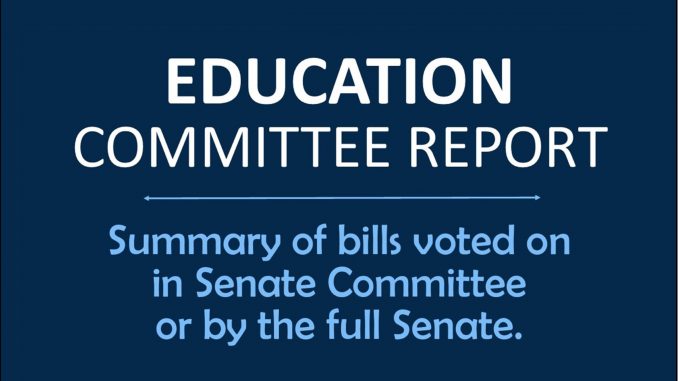
SSB 1052 – Requirements for eligibility under the all Iowa opportunity scholarship program
SSB 1099 – Public forums, speech at universities and community colleges
HF 306 – FY20 state supplemental aid at 2.06 percent
COMMITTEE ACTION:
SSB 1051 – Eligibility and reporting requirements for skilled workforce shortage tuition grant program
SSB 1051 is a technical correction to eliminate the Iowa Workforce Development reference in the Skilled Workforce Shortage Tuition Grant statute that is scheduled for repeal July 1, 2019, and ensures that students enrolled in programs of study aligned with statewide high-demand jobs continue to qualify for funding. In addition, the bill amends the program to include a grandfather clause for students receiving grants who are enrolled in a program of study that is aligned with a high-demand job that is subsequently removed from eligibility.
The Skilled Workforce Shortage Tuition Grant statute references a section of the Iowa Code requiring a report to be produced quarterly. This Code section was rescinded during the 2018 legislative session. Because the College Student Aid Commission references an Iowa Workforce Development Code section that will be repealed, a technical correction must be made. In addition, the Skilled Workforce Shortage Tuition Grant does not provide a grandfather clause for students who are enrolled in a program of study that is subsequently removed from the list of high-demand jobs.
[2/11: Short Form]
SSB 1052 – Requirements for eligibility under the all Iowa opportunity scholarship program
SSB 1052 strikes the age provisions for two populations to ensure all applicants are held to the same eligibility criteria under the All Iowa Opportunity Scholarship.
Over the course of the past two years, two new student populations have been granted access to the All Iowa Opportunity Scholarship. House File 642 granted eligible foster care students first priority for funding; and House File 2502 granted students whose parent was a public safety worker killed in the line of duty second priority for funding. The defining language for each of these student populations contains an age threshold that would allow them to lose eligibility prior to receiving the maximum benefit under the program. There is no such age threshold for the general student population.
[2/11: Short Form]
SSB 1099 – Public forums, speech at universities and community colleges
SSB 1099 governs public forums, freedom of expression and freedom of association at community colleges and state universities. It requires Regent universities and community colleges to adopt statements protecting speech; the freedom to discuss, assemble and engage in spontaneous expressive activities subject to reasonable time, place and manner restrictions; and public areas of campuses as traditional public forums. Protected activities include all forms of peaceful assembly, protests, speeches (including by invited speakers), distribution of literature and circulating petitions. The bill requires that the outdoor areas of campuses be deemed traditional public forums. Specific areas cannot be deemed free speech zones, and policies cannot otherwise restrict expressive activities to a particular outdoor area of campus.
The bill also prohibits institutions from denying a student organization any benefit or privilege available to any other student organization. An aggrieved member of the campus community may bring an action against an institution responsible for a violation of this law and may assert such violation as a defense or counterclaim.
A committee amendment was offered that made some technical changes but did not address concerns regarding the continued protection of certain protected classes under Iowa’s Civil Rights Act.
[2/13: 11-4, party-line (Yes: Quirmbach voting “yes” with Republicans)]
FLOOR ACTION:
HF 306 – FY20 state supplemental aid at 2.06 percent
HF 306 is the FY20 state supplemental aid or basic school funding for the school year starting in July 2019. HF 306 provides for a 2.06 percent increase in basic school funding, which Republicans have said they will fund at $78.6 million. This funding level includes a $22.5 million cut to the Area Education Agencies. If there was no additional cut to AEAs; SF 172’s 2.06 percent will cost $93.6 million. Governor Reynolds proposed 2.3 percent increase in state funding for schools.
General State Aid: HF 306 establishes a total cost per pupil of $6,875; an increase of $139 per pupil over last year. The 2.06 percent increase will cost the state $78.6 million more than last year. This assumes that the Legislature continues the $22.5 million AEA reduction in this year’s Standings Bill.
Categorical State Aid: The FY20 allowable growth rate for each of the State Categorical Supplements (Teacher Leadership and Compensation; Teacher Salary Supplement; and Professional Development and Early Intervention) totals $537.9 million, an increase of $10.7 million.
- Teacher Salary Supplement: $304.9 million (increase of $6 million)
- Professional Development Supplement: $34.6 million (increase of $680,000)
- Early Intervention (general purpose allowed): $35.6 million (increase of $700,000)
- Teacher Leadership Supplement: $162.7 million (increase of $3.3 million)
Budget Guarantee: This is the amount made up entirely of local property taxes to guarantee a school district receives 101 percent of the previous year’s funding level. It only occurs when a district’s enrollment decline is greater than the basic state funding percentage increase. It’s estimated that 117 districts will be on budget guarantee under 2.06 percent.
Property Taxes: Since 2013, the Legislature makes a determination on whether it will pay for the increment increase in property taxes associated with an increase in the percentage growth for schools. The total funding for this effort is now $62.1 million, an increase of $10 million over last year. This is not new money for schools, just shifting dollars from local property taxes to state funding.
A Democratic amendment to increase the state funding for schools by 3 percent, a $43 million increase over HF 306 levels, failed on a party-line vote.
[2/13: 35-13, party-line (Bisignano, Danielson, Kinney, Mathis voting “yes” with Republicans; Excused: Jochum, Nunn)]
